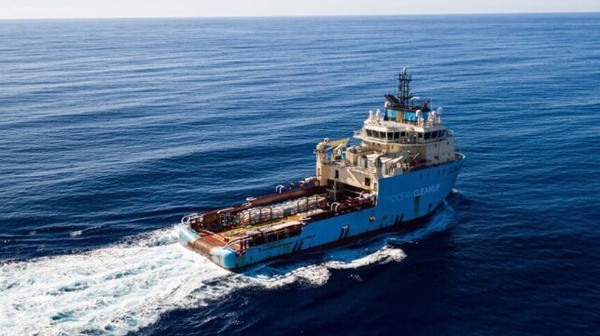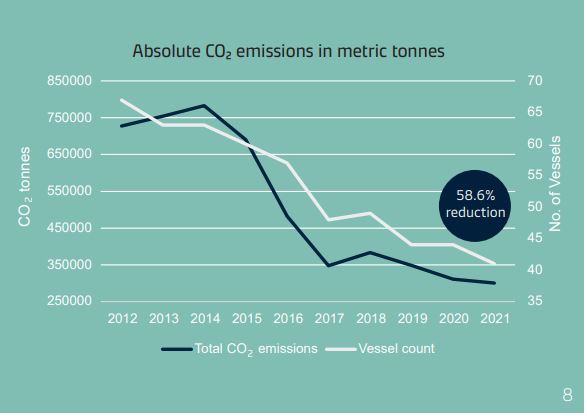INTERVIEW: A closer look at Maersk Supply Service's net zero ambition
Maersk Supply Service is on track to achieve its self-imposed net zero carbon emissions target for 2040, and is already 17% of the way there, chief operating officer Mark Handin tells Engine.

PHOTO: The Maersk Tender, which was the first vessel in the MSS fleet to trial a biofuel blend. Maersk Supply Services
Maersk Supply Service (MSS) reported that the carbon dioxide (CO2) intensity of its fleet had decreased by 15.6% in 2021, compared to the baseline year of 2018. The absolute emissions from its vessels fell by a slightly smaller 14.1% over the same period, to just over 300,000 mt in 2021.
MSS is the offshore marine services subsidiary of shipping conglomerate A.P. Moller-Maersk. It owns and operates a fleet of anchor handlers, platform supply vessels, offshore crane vessels and subsea support vessels.
Fleet divestment has contributed significantly towards MSS’s decarbonisation emissions in absolute terms, as it decreased its fleet size from 47 to 41 between 2018-2021. But its remaining vessels have also improved their carbon footprint on average.
 CHART: Maersk Supply Service’s absolute CO2 emissions in mt from 2012-2021. Maersk Supply Service Sustainability Report 2021
CHART: Maersk Supply Service’s absolute CO2 emissions in mt from 2012-2021. Maersk Supply Service Sustainability Report 2021
Mark Handin informs that MSS has now reduced the CO2 intensity of its fleet by 17% since 2018. This means that its vessels have become more energy efficient in operation, that they emit fewer grams of CO2 per kWh of power installed.
MSS has set an interim target of 50% CO2 intensity reduction by 2030, before full decarbonisation by 2040. Handin says he is optimistic that MSS will reach these goals through a series of decarbonisation initiatives.
Its efforts towards the 2030 target have so far mostly been concentrated around making its operations more energy efficient to lower its consumption of oil-based bunker fuels. Blends of biofuel and marine gasoil (MGO) have also been trialled. Towards the end of the decade, MSS says it will develop technologies and renew its fleet to reach the 50% reduction goal.
In one of the initiatives, its multi-purpose offshore vessel Maersk Minder was retrofitted with a hybrid battery system that will complement the vessel’s oil-fuelled combustion engine to reduce its CO2 emissions by around 15%.
Biofuel was tested on the anchor handler Maersk Tender during an ocean-cleaning operation in the Pacific Ocean last year. 15% hydrotreated vegetable oil (HVO) was blended with 85% marine gasoil (MGO) in a 90 mt trial stem.
The biofuel component of the blend can cut CO2 emissions from vessels by up to 90% compared to conventional fuels, MSS says, and last month it announced these blends will be expanded to vessels across its fleet.
With 15% HVO, this would mean an average CO2 emissions reduction of 13.5% from the whole biofuel-MGO blend.
MSS customers can also opt to offset 100% of the CO2 emitted from combustion of the fuels burned on MSS vessels by paying a premium.
The vessels will still burn largely oil-based bunker fuels, but as some of customers opt for zero offsets and others opt for up to 100%, mass-balancing of shifting offsets around will be used to make the equations add up.
An MSS spokesperson explains that this option “works on the same principle as the carbon offsetting, but this process is called ‘insetting’ as the reductions happen on our own fleet.”
Looking ahead towards net zero, Handin says MSS are exploring green methanol as a fuel to power its future fleet. It could invest in dual-fuel vessels capable of running on green methanol and conventional fuels – a similar engine concept to what was ordered by the parent company in August last year.
Designing a zero-carbon offshore supply vessel for the medium-term is also a possibility.
Drawing on studies into methanol and other alternative fuels by the Maersk Mc-Kinney Moller Center for Zero Carbon Shipping can help MSS transition to greener fuels, Handin says.
By Konica Bhatt
Please get in touch with comments or additional info to news@engine.online






